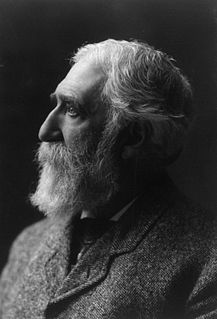A Quote by Charles Dudley Warner
The wise man does not permit himself to set up even in his own mind any comparisons of his friends. His friendship is capable of going to extremes with many people, evoked as it is by many qualities.
Related Quotes
The wise man does nothing but what can be done openly and without falseness, nor does he do anything whereby he may involve himself in any wrong-doing, even where he may escape notice. For he is guilty in his own eyes before being so in the eyes of others; and the publicity of his crime does not bring him more shame than his own consciousness of it.
Whoever is wise is apt to suspect and be diffident of himself, and upon that account is willing to "hearken unto counsel"; whereas the foolish man, being in proportion to his folly full of himself, and swallowed up in conceit, will seldom take any counsel but his own, and for that very reason, because it is his own.
There is no more precious experience in life than friendship. And I am not forgetting love and marriage as I write this; the lovers, or the man and wife, who are not friends are but weakly joined together. One enlarges his circle of friends through contact with many people. One who limits those contacts narrows the circle and frequently his own point of view as well.
The fact that labour is external to the worker, i.e., it does not belong to his intrinsic nature; that in his work, therefore he does not affirm himself but denies himself, does not feel content but unhappy, does not develop freely his physical and mental energy but mortifies his body and his mind. The worker therefore only feels himself outside his work, and in his work feels outside himself.
Idleness is often covered by turbulence and hurry. He that neglects his known duty and real employment naturally endeavours to crowd his mind with something that may bar out the remembrance of his own folly, and does any thing but what he ought to do with eager diligence, that he may keep himself in his own favour.
The man who enters combat encased in solid armor plate, but lacking the essential of selfconfidence, is far more exposed and naked to death than the individual who subjects himself to battle shorn of any protection but his own skill, his own belief in himself and in his wingman. Righteousness is necessary for one's peace of mind, perhaps, but it is a poor substitute for agility . . . and a resolution to meet the enemy under any conditions and against any odds.
Many a man has risen to eminence under the powerful reaction of his mind in fierce counter-agency to the scorn of the unworthy, daily evoked by his personal defects, who with a handsome person would have sunk into the luxury of a careless life under the tranquillizing smiles of continual admiration.
A child in his earliest years, when he is only two or a little more, is capable of tremendous achievements simply through his unconscious power of absorption, though he is himself still immobile. After the age of three he is able to acquire a great number of concepts through his own efforts in exploring his surroundings. In this period he lays hold of things through his own activity and assimilates them into his mind.
No man can reveal to you aught but that which already lies half asleep in the dawning of your knowledge. The teacher who walks in the shadow of the temple, among his followers, gives not of his wisdom but rather of his faith and his lovingness. If he is indeed wise he does not bid you enter the house of his wisdom, but rather leads you to the threshold of your own mind.
In the ardor of his enthusiasm, a youth set forth in quest of a man of whom he might take counsel as to his future, but after long search and many disappointments, he came near relinquishing the pursuit as hopeless, when suddenly it occurred to him that one must first be a man to find a man, and profiting by this suggestion, he set himself to the work of becoming himself the man he had been seeking so long and fruitlessly.






































